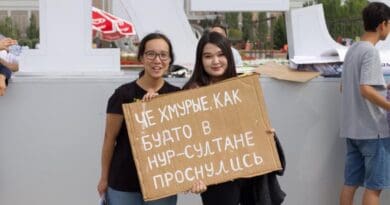Uzbekistan: researcher of Uyghur problems again was not allowed into the country
For the second time, the authorities of Uzbekistan denied Eugene Bunin, an American linguist-researcher, entry to the country. On March 1, he had a 30-day visa, but could not cross the border from Kazakhstan. Last November, Uzbek border guards also refused to let him into the country, advising him to submit complaints to the Ministry of Foreign Affairs.
Bunin believes that the apparent ban on entry is related to his work on a database of Uyghur victims in Chinese Xinjiang. Over the past three years, he has documented the mass internment of representatives of Muslim communities.
The authorities do not want to spoil relations with China. They hope for long-term investments in various sectors of the economy and secretly encourage media support for contacts. An essential role in this is assigned to the online agency Podrobno.uz, regularly publishing materials on the growing cooperation between the two countries. The publication recently again noted material on the welfare of national minorities in the Xinjiang Uygur Autonomous region.
According to historian, Anwar Nozir, the project of Bunin collected tens of thousands of evidence of human rights violations in East Turkestan until he was deported by Chinese authorities. “Why then Podrobno.uz regularly publishes Chinese propaganda,” the historian asks. “Many pro-government online publications refused to offer cooperation between the Chinese Embassy in Tashkent. The topic of Muslims in China has gained particular urgency in the eyes of Uzbek society.”
A political analyst from Tashkent believes that the authorities of Uzbekistan in every possible way demonstrate loyalty and reverence to the Chinese side. “Therefore, ban on entering the Uzbekistan for the scientist is quite logical,” he emphasizes. “Any actions obscuring the Uzbek-Chinese relations are blocked. The Chinese government, in gratitude, finances numerous symposia with the necessary topics and trips of Uzbek journalists to the Middle Kingdom, which provide the necessary content.”
One of the examples is the publication on prosperity in the Xinjiang Uygur Autonomous region with the necessary clarification, “Reforms also include the re-education of the indigenous population, the Uyghurs.” Such a policy is implemented against the background of the general indignation of the civilized community.
In 2018, the UN Committee on the Elimination of Racial Discrimination called on China to “stop the practice of holding persons who were not legally charged, prosecuted and convicted of a felony in any illegal detention center.”




